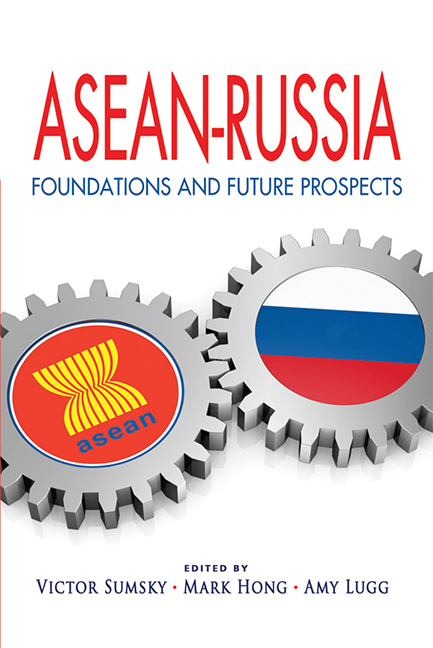Book contents
- Frontmatter
- Contents
- Foreword
- Preface
- About the Contributors
- Keynote Address
- Opening Remarks
- Keynote Address
- Introduction: Russia and the ASEAN Member States: Political and Economic Cooperation in Progress
- SECTION I WISEMEN'S VIEWS
- SECTION II GEOPOLITICS
- SECTION III BILATERAL RELATIONS
- SECTION IV Business and Economics
- SECTION V CULTURE AND EDUCATION
- Credentials of Literature
- A Sentimental Journey through ASEAN (in the Russian Way)
- Food for the Soul and the Stomach
- No Books about Singapore in Russian? Give me a Break! (An Editor's Note)
- National University of Singapore (NUS)-Russia: State of Collaboration
- Soft Power: A Comparison between Britain, France and Russia
- EPILOGUE
- Index
National University of Singapore (NUS)-Russia: State of Collaboration
from SECTION V - CULTURE AND EDUCATION
Published online by Cambridge University Press: 21 October 2015
- Frontmatter
- Contents
- Foreword
- Preface
- About the Contributors
- Keynote Address
- Opening Remarks
- Keynote Address
- Introduction: Russia and the ASEAN Member States: Political and Economic Cooperation in Progress
- SECTION I WISEMEN'S VIEWS
- SECTION II GEOPOLITICS
- SECTION III BILATERAL RELATIONS
- SECTION IV Business and Economics
- SECTION V CULTURE AND EDUCATION
- Credentials of Literature
- A Sentimental Journey through ASEAN (in the Russian Way)
- Food for the Soul and the Stomach
- No Books about Singapore in Russian? Give me a Break! (An Editor's Note)
- National University of Singapore (NUS)-Russia: State of Collaboration
- Soft Power: A Comparison between Britain, France and Russia
- EPILOGUE
- Index
Summary
ABSTRACT
This paper elaborates on the state of collaborations between the National University of Singapore (NUS) and Russian institutions, following a similar presentation made at the “ASEAN-Russia Conference: Foundations and Future Prospects” organized by the Institute of Southeast Asian Studies (ISEAS) in Singapore on 26 April 2011. It seeks to present a summary of NUS with a particular focus on international and Eastern European partnerships and invoke discussion on prospects for future cooperation. An overview of NUS and its future direction is necessary for an informed discussion of potential collaborations and thus is presented. Not resting on its laurels, the University will increasingly look east in achieving its vision to be a global knowledge enterprise centred in Asia and influencing the future, providing transformative global education and continually scaling its own peaks of excellence, in response to intense competition all over the globe.
NUS Today and Nuances of Vision
The National University of Singapore (NUS) is a leading, research intensive university. Since its earliest beginnings as a small medical school in 1905, NUS today has grown into a globally ranking university of high academic repute. With fifteen faculties and schools in three campuses, NUS offers its student populace of 37,000, of which one in three are graduate students, a full range of disciplines — from the arts, humanities and social sciences to the natural sciences, life sciences, biomedical sciences and medicine, to computational sciences and engineering. In research and education, NUS has partnerships with top universities all over the world. NUS has three Research Centres of Excellence (with National Research Foundation funding), and twenty-two university level research institutes and centres. Its professors and researchers are also working in sixteen national level research institutes and centres.
- Type
- Chapter
- Information
- ASEAN-RussiaFoundations and Future Prospects, pp. 302 - 312Publisher: ISEAS–Yusof Ishak InstitutePrint publication year: 2012



